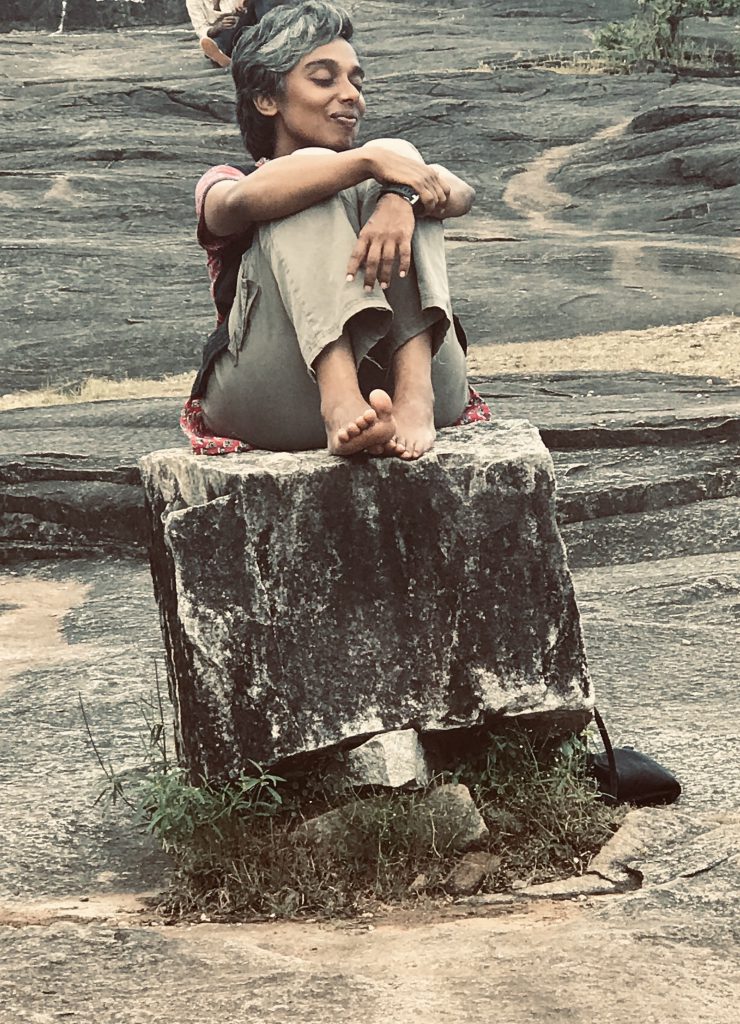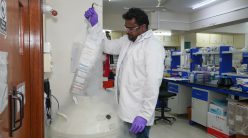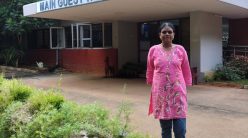The Indian science ecosystem lost Priya Iyer, a bright young scholar, earlier this year. In this tribute, Priya’s friends, colleagues and collaborators remember the difference she made in their lives and to the science of looking at the natural world.

Priya Iyer grew up on the campus of the Indian Institute of Science (IISc) in Bangalore and went to the nearby Kendriya Vidyalaya for schooling. At IISc, she fell in love with the natural world. Later, she joined IIT Kanpur for an Integrated MSc in Mathematics and in 2009, she earned her PhD from Stanford University, where she started to address important questions in evolutionary biology.
After her PhD, she joined IISER Pune as a postdoctoral research fellow while also teaching and mentoring undergraduate students. She moved to Spiti in Himachal Pradesh in 2014, to study blue sheep and ibex. In 2017, she joined the Theoretical Ecology and Evolution (TEE) Lab at the Centre for Ecological Sciences in IISc to continue her research on mathematical theory and modelling in evolutionary biology. In some of her last projects, she was exploring the diversity of mating systems found in nature and the evolution of sex roles in parental care. Influenced by her PhD advisor Joan Roughgarden’s path-breaking research, she investigated how cooperation, rather than competition, could be responsible for the diversity of behaviours seen in the natural world.
Priya, however, is no longer with us.
We could have written pages on her amazing contributions to scientific research spanning many years, and her numerous peer-reviewed publications, but those can be found online. We want this tribute to showcase her vast influence and the lasting impact she had on the people she met on her journey.
The Priya Iyer we knew would have disliked any clichéd paeans about her. The Priya we knew would have wanted us to move on and try our best in our own ways to correct all the wrongs in this world, because that was what she was doing, little by little. There was a beautiful reflective simplicity in her approach to life, her choice of words, and her lifestyle. As those who were close to her, we want to strive to keep alive her ideas, her vast empathy for others, and her deep passion for science and education in India.
It took us some time to settle down to write this tribute. Were we ready to talk about Priya through our shared memories, conversations and laughter?Would we be able to do justice to this amazing human being, who left us bereft, and too soon?
With gratitude to TheLifeofScience.com, who waited patiently while we compiled our thoughts and reflections of her, we reached out to those who also knew her and asked them to share a few lines (or more) about how they would like the world to remember Priya. We like to believe that she would have approved of this.
As we went through the notes, a few recurring themes stood out. Priya played several roles in each of our lives. She was a brilliant academician, and her teaching skills and zeal to promote a positive culture of doing science were incomparable. Vishwesha Guttal, who heads the TEE Lab at IISc, describes Priya’s intellectual calibre: “I loved the way she did her science – slow, steady, reading in-depth all the papers she cited (how many of us do that, really!). She was sharp and had deep insights. She had an amazing ability to thoughtfully create models that nicely connected with data – an art that many theoreticians must envy! On various occasions, when I am in doubt as to whether what I am doing is right, or can I do better, I ask myself, “What would Priya have done in a similar situation? I find that I can’t match how she went out of her way to help others.”
Priya was a superb mentor, and a source of strength and support to many, both within and outside the science community. She had an exceptional ability to reach out to people and help them feel better and more accepting of themselves. Be it a collaborator, a student, a colleague, or someone she met only once at a conference, she had a very personal and positive impact on everyone she interacted with. Priya’s love and compassion were unbiased. Whether it was a spider across her window, a helper in her house, or a victim in jail, she would always go to great lengths to help every living being who came into contact with her. If you knew her, you would know she always had you in mind.
Priya was a superb mentor, and a source of strength and support to many, both within and outside the science community
“She was never dismissive of anyone who wanted to speak to her about anything. I always left our conversations feeling better about myself. That was the kind of gift she was to the people who knew her,” says Sanaa Khan, a Master’s student whom Priya mentored for a project. “I’ve met many people before and since, but none gave me a sense that they truly cared about the people they interacted with, in the way she did. She was someone special and I’m glad to have known her. Because I knew her, I know what kind of person and scientist I want to be. I know I want to be patient with people, to remain open to new ideas (in science or elsewhere) and I know I want to be the kind of person who truly cares about the well-being of other people without a vested interest. That was who she was and though she is gone, her absence is a presence in my mind. She will always remain an inspiration to me.”
Vivek Jadhav, another student Priya had mentored, adds: “If you’re lucky, you work with a teacher whose influence helps you transform into a better person, and Priya was that teacher to me.” Abhilesh Dhawanjewar, a collaborator and friend, recounts, “Priya was a warm and compassionate human being who always put others’ interests before her own, especially when it came to her students. She was a very nurturing and encouraging mentor who inspired me to seek answers to my curiosities and turn them into actionable projects. Her calm, collected and caring nature magically dispelled any worries, uncertainties or chaotic elements of any project. I am who I am today, in part because of the significant role she played in my life. She is dearly missed.”
As someone who was deeply concerned with issues of social justice, equality and fairness, Priya was a resolute source of strength and support to innumerable people. Arun M, a friend and colleague from the TEE lab where she worked, recalls how she would take others’ problems as her own, and wouldn’t rest until she found a solution. Nandini Cholaraju, a close friend of Priya since her time in Spiti, adds, “I would say she was a scientist outside her lab too. She was constantly attempting to find solutions to all the problems in the world in her mind-lab.”
At Spiti, apart from her research, she also spent a lot of time with the local children, working to hone their curiosity into scientific temper. “She earned the love and respect of the locals,” says Nandini.
Karpagam Chelliah, who joined Priya’s team when was studying the courtship behaviour of the blue sheep in Spiti, brings up an incident from 2013 when Priya had literally saved her life. “We were headed from Shimla up towards Spiti, while everyone else we met on the way was sensibly travelling down the mountain. Our base camp was at an altitude of maybe 13,500 feet. It was inexplicably beautiful, mysterious and desolate. It was also extremely cold and cruelly windy – the wind felt like a searing knife in my chest when I inhaled. I was struggling to do fieldwork – could barely walk, could barely use my fingers to operate the camera or the binoculars or scribble data. I was totally useless. Priya was half my size and seemed to eat less than a sparrow, but was totally at home, running up and down the slopes with a backpack as big as her! Of course, my morale was down and I, who had dreamed of going to the Himalayas ever since I can remember, was actually longing for the tropical green mango and coconut trees and the scorching heat of Madurai, my hometown. Priya was very patient and she tried to teach me how one can overcome physical suffering with the strength of the mind. She certainly was doing it! Unfortunately, my will was not as strong as hers and on the third day, I developed altitude sickness. So while Priya did fieldwork alone, I lay down in the field station all day and all night struggling to breathe. Priya would return from fieldwork and take care of me. She would also keep the fire going, cook, clean and then organise the data collected and plan the logistics of fieldwork for the next day.
“She was constantly attempting to find solutions to all the problems in the world in her mind-lab”
“One morning, I started coughing blood and so we decided that I must see a doctor. My blood pressure was also worryingly high. We headed down to another little village, which had a Primary Health Care centre. The doctor told me that I must go down to an altitude of 8,000 feet within 24 hours otherwise I could die of altitude sickness. I told her ‘Ok we will go up to our field station to get my bags and then try to find transport back to Shimla.’ She (the doctor) exclaimed ‘Up?! – NO UP…’ So I stayed put while Priya went back UP alone and returned with my belongings. Now for the next challenge. It is not easy to find transport whenever you want. This place is remote, rugged and it was winter. The local people told us that sometimes you may have to wait more than a day for some vehicle to arrive there and you have to be an early bird to book a seat to head back down. Fortunately, there was a vehicle and Priya somehow managed to procure a seat for me in this jam-packed vehicle. I was barely conscious when she bundled me into the seat and the jeep headed down the treacherous and long road to Shimla. Priya continued the fieldwork in extreme field conditions – imagine being out in the cold, high up in the Himalayas in December and January, walking up and down collecting data! She was utterly amazing! I was convinced that she was splitting atoms for energy.”
“Had I been alone doing fieldwork alone in such conditions, I don’t think I would be alive today to reminisce about this. She saved my life and spared my family and friends the grief of the loss of a loved one. I know that she saved many others in many different ways but no less significant. She was one of the most compassionate and beautiful human beings I had ever met and I miss her very much.”
Priya wasn’t the kind of scientist to give the impression of ‘Look how great I am, put me on a pedestal’. She worked on something, not for the impact factor, the fancy new buzzwords, or the fame, but just for her love for the innumerable fascinating questions in science. She had a child-like curiosity for the world, and therefore everything around her used to excite or impact her greatly. This quality always had a cascading effect on the people she interacted with. “Her short stature belied the warm and deep timbre of her voice. The relatively high-pitched ‘Hai na?’ (Isn’t it?) and accompanying grins when we discussed anything of great interest to both of us, are forever imprinted in my mind,” says Samira Agnihotri, who co-conducted a workshop with her on conserving animal cultures at the Student’s Conference on Conservation Science, Bangalore in 2019.
Priya worked on something, not for the impact factor, the fancy new buzzwords, or the fame, but just for her love for the innumerable fascinating questions in science
Vena Kapoor, one of the people Priya had invited to collaborate on a project exploring the links between hunting strategies adopted by spiders and the sexual dimorphism they exhibit, says, “She had this rare quality of being a genuine collaborator across disciplines. When she was fascinated by a topic, she would first find out who was working on it. Scientists of Priya’s stature often only reach out to other scientists to collaborate. Priya just broke this mould.
“She would take the effort to find and meet anyone who could contribute to a subject, talk to them, and then get everyone together in the same room and somehow magically make them all feel equally heard and special. She would remember your interests, and made earnest efforts to introduce you to other people who shared these interests too.”
“In physics, during school days, we were taught about photons — compact packets of energy which together form the illuminating and life-giving light that surrounds us all. I guess there is no better way to describe Priya other than that. I want to remember her as and be inspired by, the wholesome person that she was,” says Nitin Saxena, a friend and collaborator at IISc. “She was like a gentle flower in the air that spread its fragrance to everyone who crossed its path until it vanished into the sky,” adds Nandini.
We need more people like Priya in the sciences. For the time that Priya was with us, the depth and expanse of her interdisciplinary research were equivalent to the work of numerous scientists. We hope we can all do a little of the same in our own lifetimes. This tribute was difficult to write, but we want the world to remember her kindness and her dream of science to be a more inclusive and fair space. The Priya we knew had a naive curiosity and fascination for the sciences and would love for us all to retain that.
An empathetic companion and conscientious individual, she will be profoundly missed by those whose lives she touched so gently yet impactfully. We hope you are at peace and comfort, wherever you are, Priya. We promise to strive as much as possible to take your work and dreams forward. We echo Nandini’s sentiment when she says: “I can never stop loving her because she is dead because she was unlike anyone alive. She is irreplaceable.”
This is an edited version of an article that was first published by TheLifeofScience. The original article can be found here.




